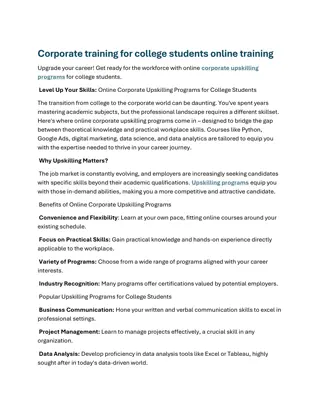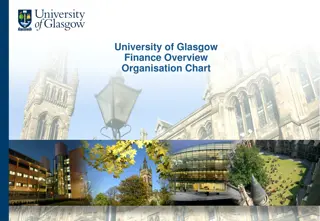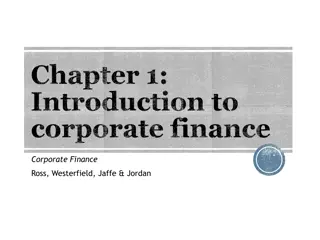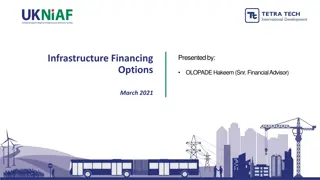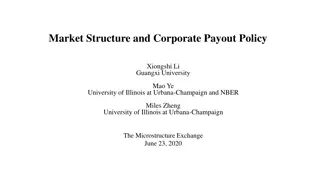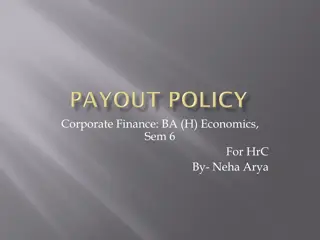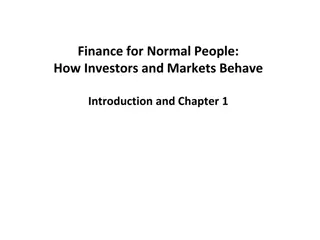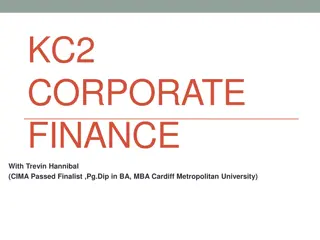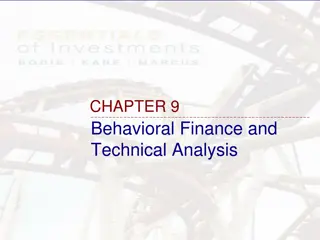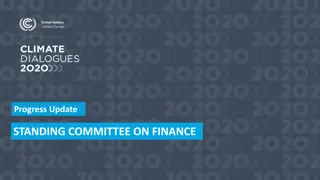Understanding Payout Policy in Corporate Finance
Explore the intricacies of payout policy in corporate finance, including cash distributions to shareholders, dividends vs. share repurchase, tax implications, signaling effects, and alternative payout methods. Discover how these factors impact financial decision-making and value creation in organizations.
Download Presentation

Please find below an Image/Link to download the presentation.
The content on the website is provided AS IS for your information and personal use only. It may not be sold, licensed, or shared on other websites without obtaining consent from the author. Download presentation by click this link. If you encounter any issues during the download, it is possible that the publisher has removed the file from their server.
E N D
Presentation Transcript
Chapter 17 Payout Policy
Chapter Outline 17.1 Cash Distributions to Shareholders 17.2 Dividends Versus Share Repurchase in a Perfect Capital Market 17.3 The Tax Disadvantage of Dividends 17.4 Payout Versus Retention of Cash 17.5 Signaling with Payout Policy 17.6 Stock Dividends, Splits, and Spin-offs 17.7 Advice for the Financial Manager
Learning Objectives Identify the different ways in which corporations can make distributions to shareholders Understand why the way in which they distribute cash flow does not affect value absent market imperfections Demonstrate how taxes can create an advantage for share repurchases versus dividends
Learning Objectives (contd) Explain how increased payouts can reduce agency problems but potentially reduce financial flexibility Understand the role of payout policy in signaling information to the market Describe alternate non-cash methods for payouts
17.1 Cash Distributions to Shareholders Payout Policy The way a firm chooses between the alternative ways to pay cash out to shareholders
17.1 Cash Distributions to Shareholders Dividends Declaration Date Ex-Dividend Date Record Date FIGURE 17.2 Important Dates for Microsoft s Special Dividend Payable Date
17.1 Cash Distributions to Shareholders Dividends Special Dividend Accounting Implications Return of Capital Liquidating Dividend
Figure 17.3 Dividend History for GM Stock, 1983-2008
17.1 Cash Distributions to Shareholders Share Repurchases Open Market Repurchase Tender Offer Dutch Auction Targeted Repurchase Greenmail
17.2 Dividends Versus Share Repurchases in a Perfect Capital Market Assume Genron has $20 million in excess cash and no debt. The firm expects to generate additional free cash flows of $48 million per year in subsequent years. If Genron s unlevered cost of capital is 12%, then the enterprise value of its ongoing operations is: Enterprise Value = PV(Future FCF)=$48million = $400million 12%
17.2 Dividends Versus Share Repurchases in a Perfect Capital Market Genron s board is meeting to decide how to pay out its $20 million in excess cash to shareholders The board is considering three options: Use the $20 million to pay a $2 cash dividend for each of Genron s 10 million outstanding shares Repurchase shares instead of paying a dividend Raise additional cash to pay an even larger dividend today and in the future 1. 2. 3.
17.2 Dividends Versus Share Repurchases in a Perfect Capital Market Alternative Policy 1: Pay Dividend with Excess Cash With 10 million shares outstanding, Genron will be able to pay a $2 dividend immediately Because the firm expects to generate future free cash flows of $48 million per year, it anticipates paying a dividend of $4.80 per share each year thereafter
17.2 Dividends Versus Share Repurchases in a Perfect Capital Market Alternative Policy 1: Pay Dividend with Excess Cash Genron s share price just before the stock pays its dividend (cum-dividend): Pcum= Current Dividend+ PV (Future Dividends) = 2+4.80 0.12= 2 + 40= $42 Genron s share price just after the stock goes ex- dividend: Pex= PV (Future Dividends) =4.80 0.12=$40
17.2 Dividends Versus Share Repurchases in a Perfect Capital Market Alternative Policy 1: Pay Dividend with Excess Cash In a perfect capital market, when a dividend is paid, the share price drops by the amount of the dividend when the stock begins to trade ex- dividend
17.2 Dividends Versus Share Repurchases in a Perfect Capital Market Alternative Policy 2: Share Repurchase (No Dividend) Suppose that Genron does not pay a dividend this year, but instead uses the $20 million to repurchase its shares on the open market How will the repurchase affect the share price?
17.2 Dividends Versus Share Repurchases in a Perfect Capital Market Alternative Policy 2: Share Repurchase (No Dividend) With an initial share price of $42, Genron will repurchase $20 million $42 per share = 0.476 million shares, leaving only 10 0.476 = 9.524 million shares outstanding
17.2 Dividends Versus Share Repurchases in a Perfect Capital Market Alternative Policy 2: Share Repurchase (No Dividend)
17.2 Dividends Versus Share Repurchases in a Perfect Capital Market Alternative Policy 2: Share Repurchase (No Dividend) The market value of Genron s assets falls when the company pays out cash, but the number of shares outstanding also falls from 10 million to 9.524 million The two changes offset each other, so the share price remains the same at $42
17.2 Dividends Versus Share Repurchases in a Perfect Capital Market Alternative Policy 2: Share Repurchase (No Dividend) Genron s Future Dividends In future years, Genron expects to have $48 million in free cash flow, which can be used to pay a dividend of $48 million 9.524 million shares = $5.04 per share each year. Thus, Genron s share price today is: Prep=5.04 0.12=$42
17.2 Dividends Versus Share Repurchases in a Perfect Capital Market Alternative Policy 2: Share Repurchase (No Dividend) Genron s Future Dividends In perfect capital markets, an open market share repurchase has no effect on the stock price, and the stock price is the same as the cum-dividend price if a dividend were paid instead
17.2 Dividends Versus Share Repurchases in a Perfect Capital Market Alternative Policy 2: Share Repurchase (No Dividend) Investor Preferences Would an investor prefer that Genron issue a dividend or repurchase its stock? Assume an investor holds 2000 shares of Genron Stock The investor s holdings after a dividend or share repurchase are:
17.2 Dividends Versus Share Repurchases in a Perfect Capital Market Alternative Policy 2: Share Repurchase (No Dividend) Investor Preferences Would an investor prefer that Genron issue a dividend or repurchase its stock? In either case, the value of the investor s portfolio is $84,000
17.2 Dividends Versus Share Repurchases in a Perfect Capital Market Alternative Policy 2: Share Repurchase (No Dividend) Investor Preferences What if the firm repurchases shares but investor wants cash? The investor could sell shares to raise cash (aka homemade dividend)
17.2 Dividends Versus Share Repurchases in a Perfect Capital Market Alternative Policy 2: Share Repurchase (No Dividend) Investor Preferences What if the firm pays a dividend and the investor does not want cash? The investor could use the dividend to purchase additional shares
17.2 Dividends Versus Share Repurchases in a Perfect Capital Market Alternative Policy 2: Share Repurchase (No Dividend) Investor Preferences In either case, the value of the investor s portfolio is $84,000 In perfect capital markets, investors are indifferent between the firm distributing funds via dividends or share repurchases By reinvesting dividends or selling shares, they can replicate
17.2 Dividends Versus Share Repurchases in a Perfect Capital Market Alternative Policy 3: High Dividend (Equity Issue) Assume Genron plans to pay $48 million in dividends starting next year Suppose the firm wants to start paying that amount today Because it has only $20 million in cash today, Genron needs an additional $28 million to pay the larger dividend now
17.2 Dividends Versus Share Repurchases in a Perfect Capital Market Alternative Policy 3: High Dividend (Equity Issue) One was way to raise more cash is to borrow money or sell new shares Given a current share price of $42, Genron could raise $28 million by selling $28 million $42 per share = 0.67 million shares
17.2 Dividends Versus Share Repurchases in a Perfect Capital Market Alternative Policy 3: High Dividend (Equity Issue) Because this equity issue will increase Genron s total number of shares outstanding to 10.67 million, the amount of the dividend per share each year will be: $48million 10.67million shares= $4.50 per share
17.2 Dividends Versus Share Repurchases in a Perfect Capital Market Alternative Policy 3: High Dividend (Equity Issue) Under this new policy, Genron s cum-dividend share price is: Pcum= 4.50+4.50 0.12= 4.50+ 37.50= $42 The initial share value is unchanged by this policy, and increasing the dividend has no benefit to shareholders
Example 17.1 Homemade Dividends Problem: Suppose Genron does not adopt the third alternative policy, and instead pays a $2 dividend per share today. Show how an investor holding 2000 shares could create a homemade dividend of $4.50 per share 2000 shares = $9000 per year on her own.
Example 17.1 Homemade Dividends Solution: Plan: If Genron pays a $2 dividend, the investor receives $4000 in cash and holds the rest in stock. She can raise $5000 in additional cash by selling 125 shares at $40 per share just after the dividend is paid.
Example 17.1 Homemade Dividends Execute: The investor creates her $9000 this year by collecting the $4000 dividend and then selling 125 shares at $40 per share. In future years, Genron will pay a dividend of $4.80 per share. Because she will own 2000 125 = 1875 shares, the investor will receive dividends of 1875 $4.80 = $9000 per year from then on.
Example 17.1 Homemade Dividends Evaluate: Again, the policy that the firm chooses is irrelevant the investor can transact in the market to create a homemade dividend policy that suits her preferences.
Example 17.1a Homemade Dividends Problem: Suppose Genron does not adopt the third alternative policy, and instead pays a $2 dividend per share today. Show how an investor holding 6,000 shares could create a homemade dividend of $4.50 per share 6,000 shares = $27,000 per year on her own.
Example 17.1a Homemade Dividends Solution: Plan: If Genron pays a $2 dividend, the investor receives $12,000 in cash and holds the rest in stock. She can raise $15,000 in additional cash by selling 375 shares at $40 per share just after the dividend is paid.
Example 17.1a Homemade Dividends Execute: The investor creates her $27,000 this year by collecting the $12,000 dividend and then selling 375 shares at $40 per share. In future years, Genron will pay a dividend of $4.80 per share. Because she will own 6,000 375 = 5,625 shares, the investor will receive dividends of 5,625 $4.80 = $27,000 per year from then on.
Example 17.1a Homemade Dividends Evaluate: Again, the policy that the firm chooses is irrelevant the investor can transact in the market to create a homemade dividend policy that suits her preferences.
17.2 Dividends Versus Share Repurchases in a Perfect Capital Market Modigliani-Miller and Dividend Policy Irrelevance In perfect capital markets, holding fixed the investment policy of a firm, the firm s choice of dividend policy is irrelevant and does not affect the initial share price
Table 17.1 Genrons Dividends per Share Each Year Under the Three Alternative Policies
17.2 Dividends Versus Share Repurchases in a Perfect Capital Market Dividend Policy and Perfect Capital Markets Although dividends do determine share prices, a firm s choice of dividend policy does not A firm s free cash flows determine the level of payouts that it can make to its investors In a perfect capital market, whether these payouts are made through dividends or share repurchases does not matter
17.3 The Tax Disadvantage of Dividends Taxes on Dividends and Capital Gains Shareholders typically must pay: Taxes on the dividends they receive Capital gains taxes when they sell their shares
17.3 The Tax Disadvantage of Dividends Taxes on Dividends and Capital Gains When a firm pays a dividend, shareholders are taxed according to the dividend tax rate If dividends are taxed at a higher rate than capital gains shareholders will prefer share repurchases to dividends Because long-term investors can defer the capital gains tax until they sell, there is still a tax advantage for share repurchases over dividends
Table 17.2 Long-Term Capital Gains Versus Dividend Tax Rates in the United States, 1971 2010
17.3 The Tax Disadvantage of Dividends Optimal Dividend Policy with Taxes The optimal dividend policy when the dividend tax rate exceeds the capital gain tax rate is to pay no dividends at all
Figure 17.4 Dividend and Capital Gains Tax Rates Around the World
17.3 The Tax Disadvantage of Dividends Optimal Dividend Policy with Taxes Dividends in Practice Prior to 1980, most firms used dividends exclusively to distribute cash to shareholders By 2009 about 30% of firms relied exclusively on dividends At the same time, 30% of all firms (and more than half of firms making payouts to shareholders) used share repurchases exclusively or in combination with dividends
17.3 The Tax Disadvantage of Dividends Optimal Dividend Policy with Taxes Dividends in Practice Dividend Puzzle When firms continue to issue dividends despite their tax disadvantage
Figure 17.5 The Rise of Repurchases
Table 17.3 Summary of Dividends Versus Repurchases








